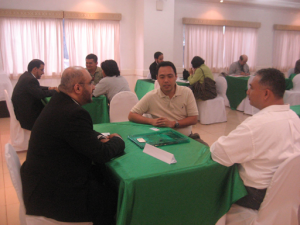
Busines Mirror | 14 December 2009
Written by Manuel T. Cayon / Reporter
DAVAO CITY—Aside from infusion of foreign assistance to put up infrastructure support to agrarian-reform communities (ARC), other countries like those from the Middle East have eyed these ARCs as their partners in the expansion needs of their agriculture production, the Department of Agrarian Reform (DAR) here said.
Yusoph Mama, director of the Davao Regional office of the DAR, said no less than 4,000 hectares in the Davao region have been identified by these Middle Eastern-based companies to grow their products.
He said Bahrain was close to perfecting an agreement with ARCs in Davao del Norte, covering 1,000 hectares.
Arabian companies have been the first international group to take interest in the wide tracts of lands now in the control of farmers who were identified as beneficiaries of the Comprehensive Agrarian Reform Program (CARP). Although distributed as family-sized lands or still undivided plantation lands, but given to farmer cooperatives, these areas are collectively called ARCs, and given priority for infrastructure and marketing support.
While the CARP aimed at harnessing the collective production potential of these farmer-beneficiaries, the program has also allowed corporations, including foreign investments, to help the ARCs find marketing or agriculture production tie-up to help improve the economic status of the beneficiaries.
Mama said the Middle East trade-and-investment mission that came here in May this year has centered on satisfying the expansion needs of these companies.
In May Agriculture Secretary Arthur Yap said the corporate executives representing big agricultural businesses in Saudi Arabia have raised concern on the Philippine agrarian reform and limiting foreign-land ownership, although they have indicated high interest in acquiring tracts of land for planting and raising poultry.
“They have raised their concern on the effect of these policies on the security of their investment,” Yap earlier told reporters in Davao City in May, during the ocular visit to the areas in the Davao Region and in northwestern Mindanao by the members of the Kingdom of Saudi Arabia (KSA) Agriculture and Trade and Investment Mission to the Philippines.
Yap said, “It was understandable for these Arabian business executives to raise the issues because some of them wanted to acquire thousands of hectares of land for planting, processing and raising livestock and poultry.”
Other Saudi businessmen wanted to explore the possibility of planting cassava and sugar. “They are more concerned in the security of their investment than the issues of armed conflict in Central Mindanao,” he said.
Twenty-six executives of big Saudi Arabian agricultural corporations joined the three-day trade mission organized by the KSA Ministry of Agriculture, a move to reciprocate a much-earlier Philippine trade-and-investment visit, composed mostly of Mindanao business groups.
These Arab businessmen have expansion projects in Sudan, Ethiopia and Egypt. The KSA trade mission, led by Agriculture Minister Fahad Bal Ghunaim, was going around Asia to explore business potentials.
Mama said the ARCs appeared to have attracted interest from the Arab business groups and assured the beneficiaries the DAR would help them with the investment tie-up.
The DAR has only 34,000 hectares remaining that have not been covered by the CARP yet, but said these lands did not pose serious problems any more. It has already covered 225,000 hectares in the Davao region, composed of the three Davao provinces, Compostela Valley and Davao City.
The covered lands represented 86 percent of the lands identified for coverage in the region.










